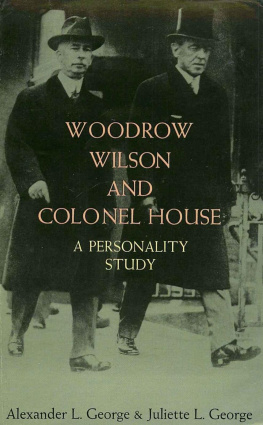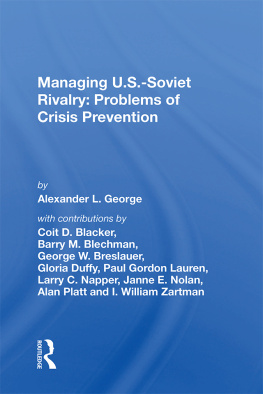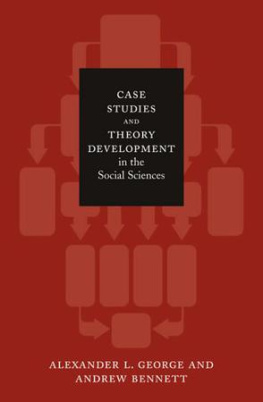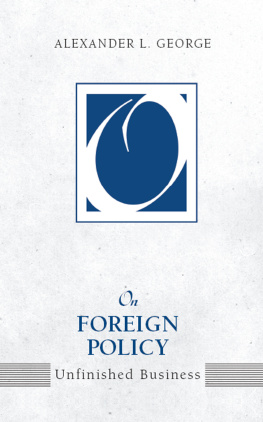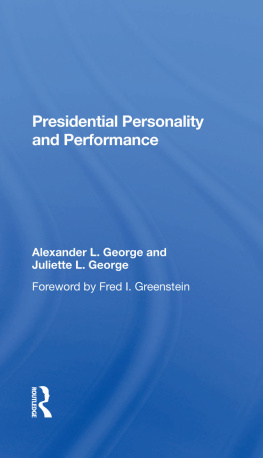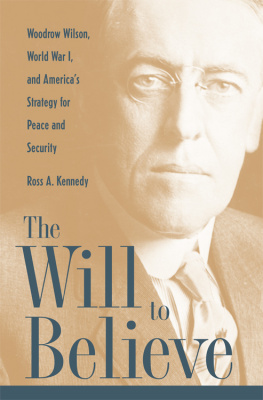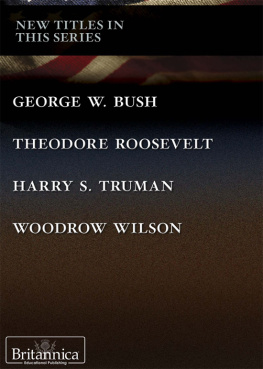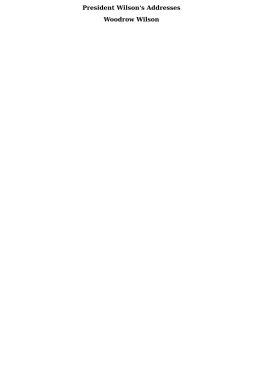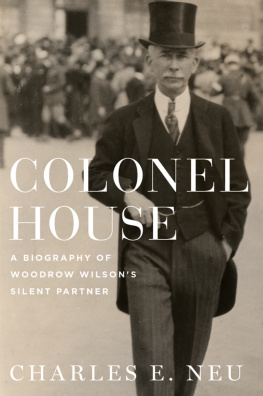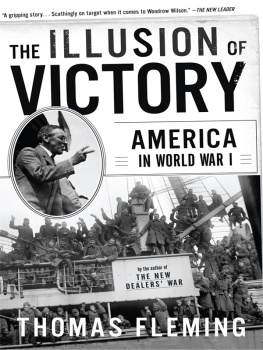Woodrow Wilson and Colonel House
A Personality Study
by Alexander L. George and Juliette L. George
Published by Plunkett Lake Press , June 2017
Copyright 1956 by Alexander L. George and Juliette L. George
Copyright 1964 by Alexander L. George and Juliette L. George
This eBook is an electronic version, with a new introduction by Stephen G. Walker, of the Dover edition, first published in 1964, which was an unabridged and corrected republication of the work first published by The John Day Company in 1956.
~ Other eBooks from Plunkett Lake Press ~
By Thomas Neville Bonner
Iconoclast: Abraham Flexner and a Life in Learning
By Jean-Denis Bredin
The Affair: The Case of Alfred Dreyfus
By David C. Cassidy
J. Robert Oppenheimer and the American Century
By Raymond B. Fosdick
John D. Rockefeller, Jr.: A Portrait
By Sebastian Haffner
Defying Hitler: A Memoir
Failure of a Revolution: Germany 1918-1919
Germany: Jekyll and Hyde
The Ailing Empire: Germany from Bismarck to Hitler
The Meaning of Hitler
The Rise and Fall of Prussia
By Kathryn Hulme
The Wild Place
By Ernest Jones
The Life and Work of Sigmund Freud
By Peter Kurth
American Cassandra: The Life of Dorothy Thompson
By Alpheus Thomas Mason
Brandeis: A Free Mans Life
By Sheldon Novick
Honorable Justice: The Life of Oliver Wendell Holmes
By Susan Quinn
A Mind of Her Own: The Life of Karen Horney
By Dorothy Thompson
Listen Hans
By Fredric Warburg
All Authors are Equal
An Occupation for Gentlemen
By Friderike Zweig
Married to Stefan Zweig
By Stefan Zweig
Freud by Zweig
Mental Healers: Franz Anton Mesmer, Mary Baker Eddy, Sigmund Freud
The World of Yesterday
For more information, visit www.plunkettlakepress.com
For our son and for Dr. Marjorie S. Braude
CONTENTS
Introduction to the eBook edition by Stephen G. Walker
The publication by Plunkett Lake Press of the eBook edition of Woodrow Wilson and Colonel House: A Personality Study by Alexander L. George and Juliette L. George introduces one of the most fascinating U.S. presidents in American history to a digital audience. His two terms in office span the height of the progressive era as well as the First World War. Wilsons decisions as president guided much of the progressive congressional legislation and domestic reforms adopted during his first term (1913-1917) while his leadership at the Paris Peace Conference shaped the Versailles Treaty and the formation of the League of Nations that ended World War I during his second term (1917-1921).
Woodrow Wilsons leadership and decision-making in foreign affairs was particularly puzzling as well as controversial. He is blamed for the failure of the United States to ratify the Versailles Treaty and join the League of Nations although there was sufficient support in the U.S. Senate to vote in favor of ratification. Wilsons refusal to accept any reservations as part of the Senates approval doomed it to defeat. The historical importance of his decisions in dealing with Senate ratification was magnified by the consequences. Without U.S. participation in the League of Nations, the principal organization for keeping the terms of the peace treaty and settling new disputes could not operate effectively. The failure of the League of Nations to keep the peace in Europe and the Far East was one of the causes of World War II.
Wilsons position on ratification was a puzzle especially in light of his expertise as a political scientist and congressional scholar who recognized the need to accommodate Senatorial opinion in order to achieve his aims as president. The solution to this puzzle offered by George and George is a psychological explanation, which emphasizes that Wilsons personal flaws as a leader originated in his personality. Their analysis of Wilson is known as one of the first serious psychobiographies in the discipline of political science. The use of psychoanalytical theory to explain Wilsons decisions makes their analysis controversial in several respects. Historians are skeptical about using psychological constructs for analysis, which are difficult to apply outside a clinical environment. There are also ethical constraints on psychiatrists that prohibit them from analyzing subjects who are not their patients. Political scientists are reluctant to assign causal importance to the characteristics of leaders compared to circumstances in the decision-making environment to explain decisions.
These difficulties and conflicts were perhaps inevitable criticisms of a study that was part of a pioneering effort by scholars such as Nathan Leites and Harold Lasswell at the University of Chicago to delineate political psychology as an interdisciplinary focus of study. It is an indirect tribute to the theoretical and methodological skills of the authors that their efforts were the focus of years of critiques by other scholars and sustained rejoinders by George and George in various professional journals such as Political Science Quarterly and Political Psychology . Their profile of Wilsons personality was also the prototypical psychological analysis of single political actors (leaders) examined by Fred Greenstein in his classic methodological treatise, Personality and Politics: Problems of Evidence, Inference, and Conceptualization. 2nd Ed. (Princeton University, 1987).
The exchanges by George and George with other scholars highlight different levels of analysis for the more casual reader to appreciate in going through the book. First, it is a historical analysis about an important period in U.S. history and the difficult decisions made for war and peace by a U.S. president. Second, it is a political analysis of the exercise of power and the respective roles of the President and the Congress in making decisions within the institutional context of the U.S. government. Third, it is a social-psychological analysis of the decision-making processes of a U.S. president and his inner circle of advisors in dealing with both the U.S. Senate and representatives of the victorious Great Powers at the end of World War I. These different strands of the analysis combine to offer a cautionary philosophical tale in which realists and idealists clashed over the course of public affairs.
In sum, Woodrow Wilson and Colonel House: A Personality Study is a rich analysis of the exercise of political leadership during an important period in U.S. history and world politics. George and George make a strong case that Woodrow Wilsons personality is indispensable in accounting for the actions of the U.S. government and in explaining the paradoxical outcomes of both winning the war and losing the peace in the world politics of the early 20th century. Without including Wilsons actions in shaping the peace treaty and also his actions in obstructing its ratification by the US. Senate, it is difficult to explain the course of international relations between the two world wars.
It is also clear from the analysis by the Georges that Wilsons personality shaped his actions. The opposition that he faced from antagonists in the U.S. Senate and the counsel that he received (but chose to ignore) from Colonel House as his main political advisor demonstrates that his personal need to pursue an unconditional strategy of domination in the exercise of power led to his defeat. He refused to reach an accommodation with his political adversaries when it was both possible and desirable, and when others placed in his position were likely to have done so. Conversely, it is also likely that someone else as president may not have been able to negotiate the reforms at home and abroad that are part of his historical legacy. These conclusions make the book worth reading and mark Wilsons personal story as a compelling demonstration of the power and promise of psychobiographical analysis.
Next page
